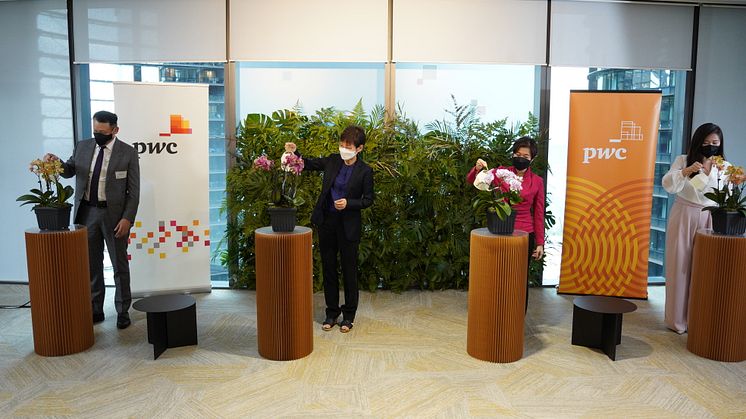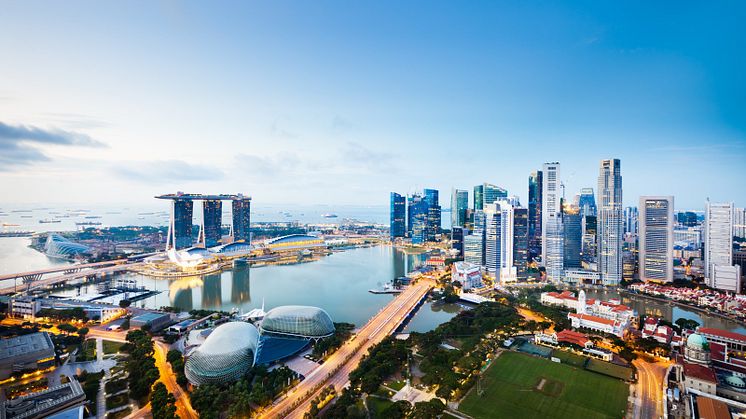
Press release -
Global carbon pricing could pay for itself while cutting emissions by 12%, says new report from PwC and the World Economic Forum
Singapore, 3 November 2021 - An international carbon price floor (ICPF) for carbon dioxide and other greenhouse gas (GHG) emissions could spur greater emissions reduction to help address the global climate crisis. But how big are the emissions reductions it would create? And how would it impact the global economy?
A new report by PwC and the World Economic Forum, “Climate Ambition: Analysis of an International Carbon Price Floor” finds that an ICPF could reduce global GHG emissions by 12%. The cost of implementation would be less than 1% of GDP, and that cost could be offset by avoided economic losses associated with global warming and potential productive uses of carbon revenues. The report models the impact of an ICPF as proposed by the International Monetary Fund (IMF).
Separate research by PwC UK shows that the world needs a five-fold increase in the pace of GHG reduction to be on a path to limit warming below 1.5 degrees and avoid the risks of catastrophic climate change.
Key findings from the report include:
- An international carbon price could pay for itself. Assuming the revenues raised are returned to households, GDP would decrease by less than 1% across all scenarios tested. Over the longer term, much if not all of the GDP loss would be offset by reducing economic losses due to global warming: sea level rise, losses in labour and agricultural productivity, and damage to human health.
- The significant revenues generated by an ICPF could be used to support those most disadvantaged. An ICPF could raise up to 3% of GDP in revenues in some countries, which could be redistributed to lower-income households and help deliver a just transition.
- An international carbon price would effectively reduce emissions by up to 12.3%. When combined with countries’ existing pledges for emission reductions in their Nationally Determined Contributions (NDCs), this would help limit global warming to 2 degrees C above pre-industrial levels. And together with strengthened climate ambition and action, this would help give the world a better chance of reaching 1.5 degrees.
- Significant “carbon leakage” (the shifting of emissions from one jurisdiction to another because of lower carbon prices) can be avoided. The modeling found that with widespread participation in the ICPF, even with reduced price floors for low- and middle-income countries, there would be very little transfer of emissions-producing manufacturing to countries where carbon prices are lower.
Carbon today is priced at anywhere from US$0 to over US$130 per tonne of CO2 equivalent in different regions. This creates an uneven playing field and limits the climate ambition of countries that fear loss of international competitiveness. In June, the IMF put forward the framework for an ICPF that proposes different price points for emissions for economies at different stages of development to drive greater participation in emissions reduction.
Bob Moritz, Global Chairman of PwC said: “The findings of our analysis are very encouraging. Introducing an ICPF could make a significant contribution to tackling global warming by accelerating emissions reductions. We found this could be done without severe economic damage to livelihoods and business, although the effects would be somewhat uneven across the world. The costs to society and business of failing to act are far greater. The political and technical challenges remain very significant, but we hope the research will encourage countries to consider pricing carbon in such a way that it scales up effort to reach net zero in time to limit the worst effects of climate change on people and our planet.”
Børge Brende, President at the World Economic Forum said: “The results of analysis of the ICPF are extremely positive. Public-private cooperation will be key for next steps and to accelerate efforts for a more sustainable and inclusive recovery.”
Marcus Lam, Executive Chairman, PwC Singapore said: “Carbon pricing is one tool that could help governments and businesses transition to a net zero future. These findings are highly hopeful, and can accelerate change, in line with Singapore’s ambitions to become a leading carbon services and trading hub.”
Fang Eu-Lin, ESG Leader, PwC Singapore said: “The findings show that the international carbon price would potentially reduce emissions by 12.3% which will indeed bring it closer to the average 12.9% decarbonisation which is needed to give us a fighting chance for a 1.5 degree celsius world.”
------------------------ Ends---------------------------
Notes to editors
To download a copy of the full report and technical addendum, visit: www.pwc.com/carbonpricing
<... IMF’s proposal calls for an ICPF for GHGs that by 2030 would reach $75 per tonne for high-income countries, $50 per tonne for middle-income countries and $25 per tonne for low-income countries (in 2018 dollars). This structure is intended to mitigate the possibility that emissions will move to countries where the cost of GHG emissions is low – carbon leakage – while encouraging low-income countries to participate.
About the World Economic Forum
The World Economic Forum, committed to improving the state of the world, is the International Organisation for Public-Private Cooperation. The Forum engages the foremost political, business and other leaders of society to shape global, regional and industry agendas.
Topics
Categories
About PwC
At PwC, our purpose is to build trust in society and solve important problems. We’re a network of firms in 155 countries with over 284,000 people who are committed to delivering quality in assurance, advisory and tax services. Find out more and tell us what matters to you by visiting us at www.pwc.com/sg.
PwC refers to the PwC network and/or one or more of its member firms, each of which is a separate legal entity. Please see www.pwc.com/structure for further details.
© 2020 PwC. All rights reserved









